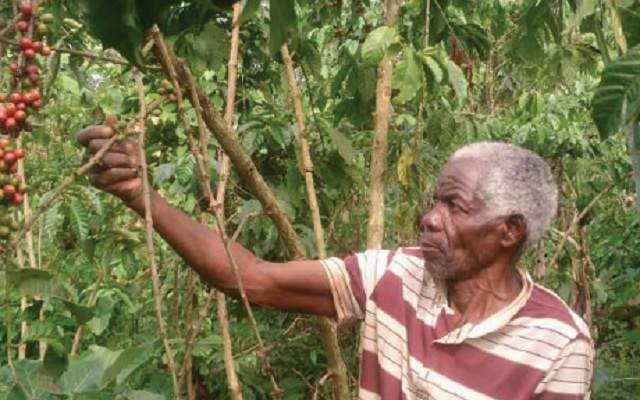
How coffee marketing arrangement is putting more money in farmers pockets, improving quality
Kampala, Uganda | ANDREW S. KAGWA | 80-year old widow Anna Kyamulabi grows coffee on her half acre farm in Bulwanyi village, near Kyengera in Wakiso District. She is a Fairtrade producer, although it unclear if she knows and understands what that is.
All she knows is that under that arrangement, an association she belongs to called Central Coffee Farmers Association (CECOFA) gives cheaper and better inputs, free farming advice and help on crop management, and processes her coffee before paying her a better price for her harvest.
“Before that middlemen would come into our village and buy coffee from us at a very cheap price because we couldn’t afford to transport it to the distant hullers at Kakiri,” she says.
CECOFA is, in fact, an exporter of coffee directly to Europe under Fairtrade International (https://www.fairtrade.net/); a global movement that aims to ensure that small-scale vulnerable farmers and workers get better prices, decent working conditions, and fair terms of trade. It covers coffee, cotton, cocoa, tea, bananas, pineapples, mangoes and nontraditional crops like fruits and vegetables and more.
Fairtrade has enabled Kyamulabi to save money from her coffee sales and start keeping a few chicken, goats, and pigs that she says she was able to buy because of the better prices.
“If we are offseason like now I can sell a chicken, pig, or goat to get money for salt, sugar, paraffin and medical bills,” she says. The medical bills are critical because she cares for her sister, Fiina, who has bedridden for years after suffering a stroke.
“Both of us lost our children to AIDS and they left us with orphans to look after,” Kyamulabi explains. She tends the garden with two of the orphans and three are too young to help.
Joseph Sematiko Kasule, a 70-year old who farms coffee on two acres in the same village also does not know much about Fairtrade. But he knows that being a member of CECOFA guarantees him a better deal than before.
“This association is better because they pay you cash when you deliver your coffee unlike the co-operatives of old where you would take your coffee and they give you chits promising to pay you later,” he says. When he has financial problems which could prevent him from maintaining the quality of coffee, the association provides materials or money to be recovered when the harvest is sold.
He has also put some of the money he earns into piggery and built himself a decent brick and iron-roof house in place of the mud-and-wattle one he lived in before. Kasule says CECOFA processes his coffee into `kase’ (Fair Average Quality) and also gives him back the coffee husks which he uses to fertilise his garden and ensure good harvests every season.
Apparently CECOFA does that for all members. It also helps them get quality chemicals when pests and diseases strike and trains them in good plant husbandry practices like weeding and pruning. Kasule says before he joined CECOFA, he could hardly get a 60 kg bag from his patch per harvest, but now he gets three to four bags.
 The Independent Uganda: You get the Truth we Pay the Price
The Independent Uganda: You get the Truth we Pay the Price






Having worked for a year now at Central coffee Farmers Association (CECOFA) as a Social and sustainability Manager, i find there is a tremendous change in as far as farmers livelihoods is concerned. Socially, the farmers in Mubende and Luweero districts are testifying the projects undergoing implementation with funding from premium funds got from Fair trade.
One challenge am noticing is the delay in funding from the social lenders. This delay has led farmers do what is commonly called “side selling” to middle men to meet their pressing demands. Probably there is need to have more than one lender to mitigate this crisis but so far the trend is promising.
Thanks also go to the Fair trade Uganda Network and particularly Justine Namayanja for her continued support in empowering the producer organizations in capacity building and organizing seminars geared towards developing these Pos